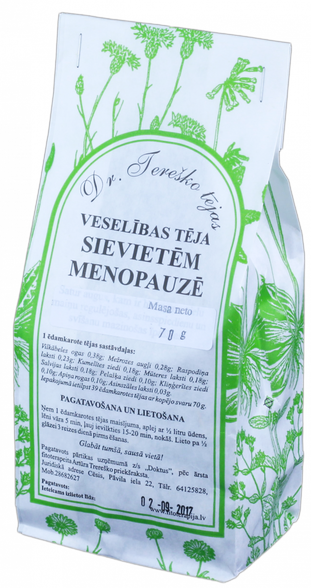DR.TEREŠKO Menopausal Wellness loose tea, 70 g
Menopause is the process of adaptation of the body to such a stage in life when the hormones produced by the ovaries stop working. The adrenal glands are the very first to enter the adaptation process, intensively producing male hormones - anrogens, which in the fat cells of the female body change (aromatize) into a female hormone - estrone, which in terms of biological activity, although weaker than the real hormone estradiol, is still sufficient effective so that the disorders characteristic of the climacteric syndrome do not appear.
Thus, women whose adrenal glands are in order experience the period of changes quite calmly. They do not need any special therapy, only a healthy lifestyle.
Why does climacteric syndrome occur? God has laid down that the brain part - the hypothalamus coordinates all hormonal and vegetative processes in the human body. This part of the brain is responsible for the tone of the blood vessels, blood pressure, for the work of the glands of external and internal secretion, as well as for the motility of the gastrointestinal tract, thermoregulation, and even for the emotional state. When the estrogen receptors in the hypothalamus do not receive information about the sufficient concentration of estrogen in the body, they sound the alarm. The hypothalamus, as a nervous director, begins to frantically take measures and introduces the whole team into a state of stress, then all disorders begin with hot flashes, sweating, blood pressure, mood swings, and digestion is disturbed, etc.
After some time, the hypothalamus gets used to the reduced amount of estrogen, and the climacteric syndrome ends without treatment, however, sometimes this process can last up to 10 years. The hypothalamus can be easily soothed with the help of phytotherapeutic and homeopathic remedies, but there is another problem - in conditions of estrogen deficiency, bone mass decreases, osteoporosis develops, and the risk of bone fracture increases.
Dry skin and mucous membranes are also very uncomfortable. That is why during this life period it is necessary to take medications from medicinal plants in order not only to eliminate symptomatic disorders, but also subsequent pathological changes.
Based on these aspects, in the case of climacteric syndrome, herbal medicine must be promoted in several directions:
- it is necessary to strengthen the work of the adrenal glands,
- it is necessary to calm the hypothalamus,
- it is necessary to take plants that contain phytoestrogens,
- it is necessary to take plants that act symptomatically - reduce sweating, blood pressure, nervousness and other disorders.
To regulate the work of the adrenal glands, you can advise licorice root, which must be taken in very small quantities - 0.1 g powder. 3 times a day. Should not be taken in case of edema, obesity, high blood pressure. A very effective root is able to prevent the onset of climacteric syndrome at the initial stage, unfortunately, there are limitations in use due to side effects.
A stimulating effect on the adrenal glands is exerted by a series of tripartite, high nettles, rose hips, field yarrow, calamus roots. An infusion of tea from these plants can be taken in a tablespoon per glass of boiling water 3 times a day, the only thing you need to consider is that nettle increases blood clotting in women, so you should not take nettle, for whom these indicators are increased.
Belladonna (belladonna), dope, henbane, nightshade, bittersweet nightshade, ergot have a regulatory effect on the hypothalamus.
Preparations from these plants prevent disorders caused by autonomic dysfunction: hot flashes, sweating, heart palpitations, dizziness and nausea.
It must be borne in mind that these plants are poisonous, one should not self-medicate, however, preparations with the constituent parts of these plants can be purchased at the pharmacy.
Homeopathic remedies work wonderfully, which the homeopath will advise individually for each case.
Phytoestrogens contain oregano, red clover, hop cones. There are no restrictions on the use of these plants.
There are some plants that prevent hormone imbalances in the female body by decreasing prolactin levels. These are such wonderful plants as sage, dill, fennel, cumin.
In the case of climacteric syndrome, it is important to normalize blood pressure and heart function. In the case of variable blood pressure and heart rate, infusions of teas from thorny hawthorn, adonis, lily of the valley, mistletoe, yellow melilot are recommended. Sleep disturbances are reduced by angelica root, preparations of cyanosis leaves, valerian root. You can achieve morning alertness by taking a teaspoon of radiola, ginseng or leuzea extract.


